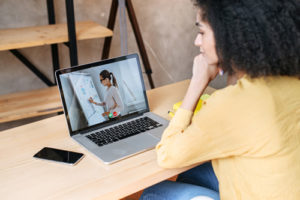As many of us struggle to build viable relationships with our students while continuing to navigate the vagaries of pandemic restrictions, it might be a good time to revisit one of the core opportunities for student-instructor interaction: grading and individualized feedback.
Given the structure of current state-of-the-art learning management systems (LMSs), instructors have great flexibility to provide individualized feedback in a variety of forms including audio or video commentary.
Related content: 3 ways tech can enhance student feedback
Potentially the first and most important facet to ensure providing feedback is timeliness. There is no single best timeframe in which to provide feedback other than to ensure students know when to expect to receive it.
One good rule of thumb is to try to grade materials in the same amount of time in which students had to complete the assignment. So, if they had a week to submit the assignment, try to return materials within a week. If that is not practical, make sure students know when they should expect feedback. Beyond that, keeping grades up to date within the LMS so students can keep abreast of their status within the course is also important. One of the largest and loudest complaints students have of professors seems to be a lack of timely grade reporting.
Once the hurdle of timeliness is addressed, instructors can focus on providing individualized feedback for each assignment. Specific and individualized feedback has been shown to be more helpful to students than “Good job!,” “Excellent,” or “Let’s improve this!” (Guskey, 2019). Guskey reviews Elias Page’s 1958 study of student achievement based upon improvement from the level of feedback they receive. Those students who received a standard comment like those above did better than students who simply received a grade. However, the students who improved the most received individualized feedback. It is important to provide some level of detailed feedback to all students except those few who turn in assignments that exceed all the criteria. For those assignments, it is common to ask the student if their paper can be used as an exemplar for future versions of the course. More recently, the Northwest Regional Educational Laboratory’s Icebreaker page provides a summary of more recent literature supporting specific and timely feedback. Providing student exemplars is another helpful way to support students.
The tone of the feedback is important. Try to follow the same format that was historically taught when writing a thank you note. Avoid using “I“ and focus on “you” in the paper. Focusing on what the student did is important. When possible, focus on aligning to the standard of the assignment and not what the instructor personally would like to see in the assignment. Wherever possible, try to highlight at least a balance of positive points and areas for improvement (Fiock & Garcia, 2019). Always end the feedback with an offer for the student to reach out of they have questions. That is important to encourage students to reach out. Fiock and Garcia outline several ways to use technology effectively in providing student feedback.
One way to ensure students take feedback seriously is to allow them to incorporate it into a second iteration of the assignment. If the goal of a course is to ensure students master a set of course objectives, allowing students to revise assignments is a legitimate way to help students master subject matter (UNC Charlotte, Giving grades and feedback). It also seems to send the message to the students that the instructor cares about their personal and academic development. Students have often been surprised when they are first offered the opportunity to revise an assignment. One caveat is that the initial iteration of the assignment must have shown a good faith effort. In many cases, the student simply misapplied or misunderstood a specific facet of the rubric (for more on creating good rubrics, see IUPUI’s Creating and using rubrics.) With some specific direction and often a conversation with the student to ensure they understand what is required, students are often eager for a second opportunity to show their mastery of a given topic.
In support of motivating students to consider revising assignments, it can be vital to allow students to understand how their performance aligns to that of their peers. Providing a summary of overall student performance on assignments or specific aspects of a rubric can be a helpful learning experience. It can often be a way for students to feel better about their individual performance within the overall group performance or an encouragement for the student to put forth more effort.
The process of reviewing the collective performance of the course is helpful to the instructor, as well to highlight any areas where instruction could be improved, or where specific content more clearly highlighted within the instructional process. It can be one more avenue for students and instructors to connect to converse about student performance.
Providing individualized feedback via audio or video is another potential way to connect with students. Each of the major LMSs has specific tutorials on providing such feedback. (Examples are linked at Canvas, D2L, Blackboard). The key is to ensure that the feedback is timely, specific, balanced, and encouraging the student to strive towards mastery if they have not already mastered the materials presented. Those issues are more important than the medium used to provide the feedback.
- Key elements for building a liquid syllabus - January 26, 2024
- How to detect AI-generated text in student work - December 22, 2023
- What students want from their instructors - November 20, 2023

